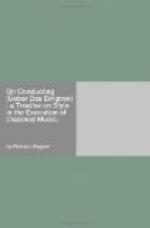Herr Eduard Devrient, in his “Erinnerungen,” has given us an account of the difficulties his friend Mendelssohn met with in the search for a textbook to an opera. It was to be a truly “German” opera, and the master’s friends were to find the materials wherewith to construct it. Unfortunately, they did not succeed in the quest. I suspect there were very simple reasons for this. A good deal can be got at by means of discussion and arrangement; but a “German” and “nobly-serene” opera, such as Mendelssohn in his delicate ambition dreamt of, is not exactly a thing that can be manufactured—nor old nor new testamentary recipes will serve the purpose. The master did not live to reach the goal: but his companions and apprentices continued their efforts. Herr Hiller believed he could force on a success, simply by dint of cheerful and unflagging perseverance. Everything, he thought, depends upon a “lucky hit,” such as others had made in his very presence, and which steady perseverance, as in a game of chance, must, sooner or later, bring round to him. But the “lucky hit” invariably missed. Schumann also did not succeed, [Footnote: “Genoveva,” Oper in vier Acten, nach Tieck und F. Hebbel, Musik von Robert Schumann. Op. 81.”] and many other members of the church of abstinence, both adepts and neophytes, have since stretched forth their “chaste and innocent” hands in search of an operatic success—they troubled greatly—but their efforts proved fruitless—“the fortunate grip” failed.
Now, such experiences are apt to embitter the most harmless persons. All the more so, since Capellmeisters and Musikdirectors are daily occupied at the theatres, and are bound to serve in a sphere in which they are absolutely helpless and impotent. And the causes of their impotence, with regard to the composition of an opera, are also the causes of their inability to conduct an opera properly. Yet such is the fate of our public art, that gentlemen who are not even able to conduct concert music, are the sole leaders in the very complicated business of the opera theatres! Let a reader of discretion imagine the condition of things there!
I have been prolix in showing the weakness of our conductors, in the very field, where, by rights, they ought to feel at home. I can be brief now with regard to the opera. Here it simply comes to this: “Father, forgive them; for they know not what they do.” To characterize their disgraceful doings, I should have to show how much that is good and significant might be done at the theatres, and this would lead me too far. Let it be reserved for another occasion. For the present I shall only say a little about their ways as operatic conductors.




